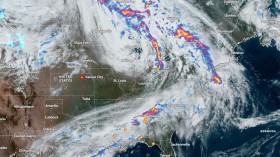In her research entitled "Detecting Biomarkers of Secondhand Marijuana Smoke in Young Children," Karen Wilson of the Icahn School of Medicine at Mount Sinai and the American Academy of Pediatrics Julius B. Richmond Center of Excellence in the United States detected traceable levels of tetrahydrocannabinol (THC) - the mind-altering chemical found in cannabis or marijuana plant and the world's oldest hallucinogenic drugs - in the urine of children exposed to secondary marijuana smoke.
In the past, analytical methods were mostly developed to measure biomarkers of marijuana in users themselves. But in this study, an advanced and more sensitive analyzing technique was developed and conducted by the US Centers for Disease Control and Prevention (CDC) to quantify biomarkers from secondhand exposure to marijuana.
This method was used to analyze urine samples from 43 babies aged one and two years who were hospitalized with bronchiolitis in Colorado, US between years 2013 and 2015. All of which were tested for marijuana metabolites (measured as levels of COOH-THC) and cotinine, a biomarker for tobacco exposure, Eureka Alert reports.
"While documenting the presence of metabolites of THC in children does not imply causation of disease, it does suggest that, like tobacco smoke, marijuana smoke is inhaled by children in the presence of adults who are using it," Wilson explained.
Published in Springer Nature's journal Pediatric Research, the study has found 16 percent of the samples had detectable COOH-THC at concentrations between 0.04 and 1.5 nanograms per milliliter of urine. Higher concentrations were found in the urine of non-white children compared with white children.
In addition, in 56 percent of kids with detectable COOH-THC levels, more than 2.0 nanograms of cotinine per milliliter of urine were also measured. Meaning, children exposed to marijuana are possibly exposed to tobacco, too, which alarmingly heightens their vulnerability to cognitive problems and respiratory ailments.
A 2015 study in the journal Clinical Pediatrics noted drowsiness, lethargy, a lack of coordination, irritability, and confusion as minor marijuana effects in children. Although less common, more serious effects included coma and seizures.
© 2024 NatureWorldNews.com All rights reserved. Do not reproduce without permission.

![Microplastics Escape Body's Gut to 'Infiltrate' the Brain, Kidneys and Liver [Study]](https://1471793142.rsc.cdn77.org/data/thumbs/full/70195/280/157/50/40/microplastics-escape-bodys-gut-to-infiltrate-the-brain-kidneys-and-liver-study.jpg)



